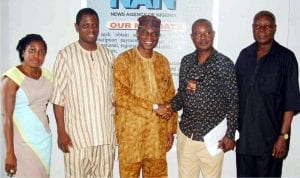Business
FG Announces New Pump Price For PMS

L-R: Communication Officer, Consumer Advocacy Foundation of Nigeria, Adu Elizabeth, Chairman, Nigeria Association of Small Scale Industrialists, Great Akintunde, Head of Lagos Operation, News Agency of Nigeria, Mr Joe Bankole, National Financial Secretary, National Association of Nigerian Traders, Ebere Nnakife and Chief Executive Officer, Fortworth Communication Agency, Goddy Ikeh, during a courtesy visit by a private sector coalition to Nan office in Lagos, yesterday
The Federal Government on
Wednesday announced a new pump price of Premium Motor Spirit (PMS) which should not be above N145 per litre.
This is contained in a statement issued by the Minister of State for Petroleum, Mr Ibe Kachikwu, and read to State House Correspondents.
The Minister said the decision was taken at the end of the stakeholders meeting presided over by Vice President Yemi Osinbajo.
According to the statement, any Nigerian is free to import the product and sell at a price not above N145 per litre.
“In order to increase and stabilise the supply of the product, any Nigerian entity is now free to import the product subject to existing quality specifications and other guidelines issued by Regulatory Agencies.
“All oil marketers will be allowed to import PMS on the basis of FOREX procured from secondary sources and accordingly PPPRA template will reflect this in the pricing of the product.
“Pursuant to this, PPPRA has informed me that it will be announcing a new price band effective today, 11th May, 2016 and that the new price for PMS will not be above N145 per litre,’’ the minister said.
He said the government expected that the new policy would “lead to improved supply and competition and eventually drive down pump prices, as we have experienced with diesel.
“In addition, this will also lead to increased product availability and encourage investments in refineries and other parts of the downstream sector.
“It will also prevent diversion of petroleum products and set a stable environment for the downstream sector in Nigeria.’’
Kachikwu said that the government shared the pains of Nigerians but, “the inherited difficulties of the past and the challenges of the current times imply that we must take difficult decisions on these sorts of critical national issues’’.
He said that along with the decision, the federal government had in the 2016 budget made an unprecedented social protection provisions to cushion the current challenges.
“We believe in the long term, that improved supply and competition will drive down prices.
“The DPR and PPPRA have been mandated to ensure strict regulatory compliance including dealing decisively with anyone involved in hoarding petroleum products,’’ the minister added.
The minister said that the stakeholders’ meeting had reviewed the current fuel scarcity and supply difficulties in the country and the exhorbitant prices being paid by Nigerians for the product.
He said that the meeting observed that prices ranged on the average from N150 to N250 per litre.
He said the meeting also noted that the main reason for the current problem “is the inability of importers of petroleum products to source foreign exchange at the official rate’’.
According to him, this is due to the massive decline of foreign exchange earnings of the federal government.
He said that as a result, private marketers were unable to meet their approximate 50 per cent portion of total national supply of PMS.
He said that following a detailed presentation by him, it “has now become obvious that the only option and course of action now open to the government is to take the decisions’’.
Kachikwu said the meeting had in attendance the leadership of the Senate, House of Representatives, Governors Forum, and Labour Unions.
Business
Nigeria’s ETF correction deepens as STANBICETF30, VETGRIF30 see 50% decline in a week

Business
BOI Introduces Business Clinic

Business
Dangote signs $400 mln equipment deal with China’s XCMG to speed up refinery expansion

-
Maritime5 hours ago
Customs Declares War Against Narcotics Baron At Idiroko Border
-
Maritime5 hours ago
NIMASA,NAF Boost Unmanned Aerial Surveillance For Maritime Security
-
Maritime5 hours ago
Nigeria To Pilot Regional Fishing Vessels Register In Gulf Of Guinea —Oyetola
-
Maritime5 hours ago
NIWA Collaborates ICPC TO Strengthen Integrity, Revenue
-

 Business5 hours ago
Business5 hours agoBOI Introduces Business Clinic
-
Maritime5 hours ago
NIMASA GETS NEW MARITIME GUARD COMMANDER,ADOKI
-

 Business5 hours ago
Business5 hours agoDangote signs $400 mln equipment deal with China’s XCMG to speed up refinery expansion
-

 Politics6 hours ago
Politics6 hours agoGroup Hails Tinubu’s Swift Assent To 2026 Electoral Bill

